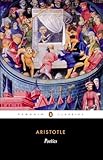Poetics
Material type: TextPublication details: London; Penguin; 1996Description: 62p.-ISBN:
TextPublication details: London; Penguin; 1996Description: 62p.-ISBN: - 9780140446364
- 185 ARI
| Item type | Current library | Call number | Status | Date due | Barcode | Item holds |
|---|---|---|---|---|---|---|
|
|
Gandhi Smriti Library | 185 ARI (Browse shelf(Opens below)) | Available | 97912 |
Browsing Gandhi Smriti Library shelves Close shelf browser (Hides shelf browser)

|

|

|

|

|

|

|
||
| 185 ARI De Anima : on the soul | 185 ARI Metaphysics | 185 ARI Nicomachean Ethics | 185 ARI Poetics | 185 COM Companion to Asistotle / edited by Georgios Anagnostopoulos | 185 THE Understanding moral weakness | 188 CAM Cambridge companion to the stoics/ edited by Brad Inwood |
One of the most powerful, perceptive and influential works of criticism in Western literary history
In his near-contemporary account of classical Greek tragedy, Aristotle examines the dramatic elements of plot, character, language and spectacle that combine to produce pity and fear in the audience, and asks why we derive pleasure from this apparently painful process. Taking examples from the plays of Aeschylus, Sophocles and Euripides, the Poetics introduced into literary criticism such central concepts as mimesis ('imitation'), hamartia ('error') and katharsis ('purification'). Aristotle explains how the most effective tragedies rely on complication and resolution, recognition and reversals. The Poetics has informed thinking about drama ever since.
Translated with an Introduction and Notes by Malcolm Heath


There are no comments on this title.